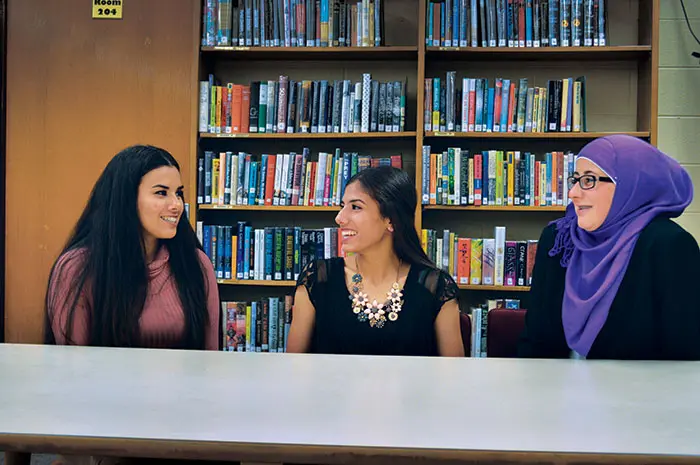
|
| ESL students speak up at Crestwood School District meeting, May 24 – Photo by The Arab American News |
DEARBORN HEIGHTS — Mina Aldayyeni’s least favorite class in eighth grade was gym. She was bullied, always picked last in sports and had no friends. One time, she found herself crying on the locker room floor, surrounded by her classmates hovering over her. They beat her.
Mina could not defend herself or explain to her teacher what had happened, because she did not speak a word of English.
Her family had just moved from Jordan and enrolled her in the Crestwood School District.
She had no friends, was separated from her younger sister and was not used to cliques in American schools. Every school day, she spent three hours glaring at a computer screen, trying to learn English through a program.
The lessons were tough, as was finding comfort in friends. She sometimes contemplated suicide.
“It was horrible,” she said Wednesday, in perfect English.
Aldayyeni, now 20, is a technician at a local hospital and said she loves her job more than anything.
Zainab Beydoun-Jawad, her English as a Second Language teacher at the time, said she vividly remembers when Aldayyeni was beaten in the locker room. She saw her on the ground, bruised. She picked her up and took her to the office.
“She was the newcomer; she was different; she was an easy target,” Beydoun-Jawad said. She described the struggles Aldayyeni endured as “heart-breaking.”
At the time, the Crestwood School District’s ESL program was in its infancy. Even six years ago, there were few immigrant families in the area, Dr. Hiba Elhajj, the high school’s ESL program coordinator, said.
Elhajj, who crafted the district’s ESL curriculum, said there are now three adaptive ESL levels, teachers who provide additional support in “mainstream” classrooms and a system that allows immigrant parents able to be involved.
The program goes well beyond teaching students English, Elhajj said. To newcomers like Aldayyeni, understanding Western culture and adapting to the confusing American school system’s ways is a daily battle.
More families in the area have fled the clutches of war than ever. Subsequently, more immigrant children, some with troubling educational foundations, are enrolling in Crestwood district schools, Elhajj said.
These families share similar experiences to Aldayyeni’s. Her family was forced to flee their homeland, Iraq. A militant faction in the region who disliked her family’s modern lifestyle made her father swear an oath to never again set foot in the country. They fled to Jordan, where Aldayyeni experienced a similar culture shock to the one she’d later face in the U.S. They stayed a short while, until they were granted asylum in the United States.
“The need is growing and our demographic at this district are changing,” Elhajj said. “The number of immigrant students and the number of Arabic-speaking students are increasing tremendously.”
Elhajj said when they move here, many of the children become withdrawn and intimidated. One immigrant middle schooler used to break out in tears when greeted by elders.
Some students face great academic challenges. The teachers said that this year, several students in their classrooms are illiterate in both their native languages and in English.
In bringing the students up to speed, ESL teachers often find themselves in the roles of counselors. They become students’ life coaches; their mentors into life in a new world.
The instructors said they spend a lot of one-on-one time with students, striving to learn from them about their cultures, to understand their family dynamics and get households to be more involved in their children’s’ learning.
And it’s working. Immigrant parents are becoming more heavily involved in school work, extracurricular activities and school business, Beydoun-Jawad said, pointing to the passing of the district’s $35 million bond to renovate the schools.
Elhajj said the next step in strengthening the continuum starts at the home, extends to the school and back to the home.
She said they have already implemented events and programs geared toward parent participation, like a Thanksgiving feast where students present the meaning of the holiday and parents get to dine with teachers.
Beydoun-Jawad and Elhajj agreed that hardships aside, the ESL students are highly motivated and have big aspirations.
Aldayyeni’s aspiration came after she broke her leg. She had to make several visits to the hospital, where she found herself captivated by the world of medicine and helping others. She knew she wanted to be a physician when she grew up.
Aldayyeni, who takes no less than 18 credits per semester at Henry Ford College, now carefully wends her way through the pages of an MCAT book, seeking to become the doctor she dreamt of being.
Not seeing where the students end up after graduating is tough, but being their mentors is what gets the teachers up in the morning.
“These girls have come such a long way,” Beydoun-Jawad said. “I get teary-eyed when I see them.”
“It’s amazing; they emerge as totally new human beings,” Elhajj agreed.






Leave a Reply